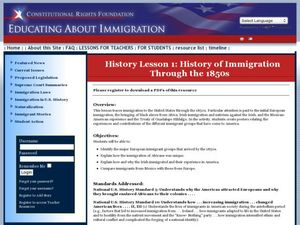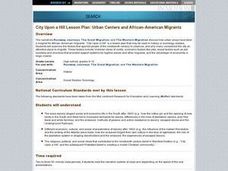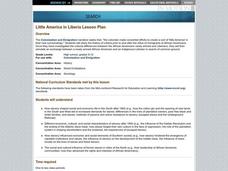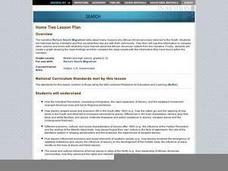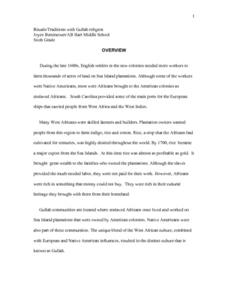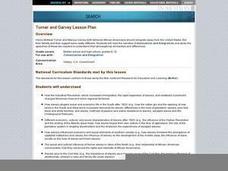Crafting Freedom
Harriet Jabocs and Elizabeth Keckly: The Material and Emotional Realities of Childhood in Slavery
Learning how to make accurate inferences by putting together facts found in multiple sources is one of those skills all learners must develop, but one that can be a challenge to teach. This resource is a must-have for your curriculum...
Curated OER
They're Only Children
Third graders compare how the lives of African American slave children differed from children's lives today. For this analysis of slavery lesson, 3rd graders evaluate and discuss the conditions of slavery in collaborative groups. Using...
Curated OER
Downing's Oyster House: Building New York
Fourth graders explore African American contributions to New York City. In this antebellum New York lesson plan, 4th graders research the accomplishments of Thomas Downing. Students explore primary and secondary sources about Downing's...
Curated OER
History of Immigration through the 1850's
Students research the history of Immigration. For this World History lesson, students explore European immigration then specifically focus on ways African Immigration was different. Students then divide into small groups and create a...
Curated OER
Colonial New York Slave Codes: Law and Order
Build a historical perspective from four different points of view. Young historians take on the role of a slave-owning white person, non-slave owning white person, slave, or free African-American person and imagine what life would be...
National Endowment for the Humanities
David Walker vs. John Day: Two Nineteenth-Century Free Black Men
What was the most beneficial policy for nineteenth-century African Americans: to stay in the United States and work for freedom, or to immigrate to a new place and build a society elsewhere? Your young historians will construct an...
Curated OER
City Upon a Hill: Urban Centers and African-American Migrants
Students examine why fugitive slaves migrated to cities and towns rather than rural areas. In this lesson, students consider the social, economic, and political benefits provided by cities and towns in comparison to rural areas.
Curated OER
Transportation and African-American Migration
Students explore the means of transportation available in the 19th century and its role as both facilitator and enabler of the westward expansion. They create a project board illustrating their findings.
Library of Virginia
Antebellum Freedom
From indentured servitude to involuntary race-based servitude, slavery has taken many forms in American history. Class members examine three manumission petitions that reveal how the rights of African Americans and African American...
Curated OER
Colonization
Students explore why the Americas attracted Europeans, why they brought enslaved Africans to their colonies, and how Europeans struggled for control of North American and the Caribbean.
Curated OER
The Living Museum: George Washington, the Slave Owner
Eighth graders bring early America to life. In this George Washington lesson plan, 8th graders listen to a lecture about the first president, explore the relationships he had with his slaves, and research the backgrounds of some of his...
Curated OER
Little America in Liberia
Students study the history of Liberia prior to and after the influx of immigrants of African Americans. They investigate the cultural differences between the African Americans and newly-arrived Liberians.
Curated OER
Voluntary Movement or Not? Africian-American Movement to the West
Ninth graders, in groups, determine reasons for African-American migration to the west
Curated OER
Home Ties
Students explore the reasons people choose to migrate including political, economic and familial motivations. They interview family members and compare their ancestors own reasons for migration to those of African American urban migrants.
Curated OER
Rituals/traditions with Gullah religion
Sixth graders discuss some of the earliest people who lived in each region in order to comprehend how humans interacted with the environmental conditions at that time. They make connections to present-day regions including...
Curated OER
Differences in Location Lesson Plan: Treatment of Early African Americans
Students reach The Domestic Slave Trade, then examine the differences between the people enslaved in North America as opposed to those in Brazil.
Curated OER
African American Emigration: Turner and McNeal
Students discuss reasons why African Americans may have wanted to emigrate from the United States followig the Civil War. They complete a Venn diagram noting the differences between proposals by Marcus Garvey and Henry McNeal Turner.
Curated OER
MANY REASONS TO LEAVE
Students research different economic, cultural, and social characteristics of slavery after 1800, how slavery hindered the emergence of capitalist institutions and values, and slavery both prior to and after the Civil War.
Curated OER
What Would Hannah Think?
Students read excepts from various government documents on the issue of slavery in America. Using the internet, they research a topic related to slavery of interest to them and present to the class their findings. They examine the life...
Curated OER
Black Women in Delaware's History
Learners study the number of slaves in the US in 1790 by state and answer questions. They imagine that they were an enslaved African American women and determine how their life changed when slavery ended.
Curated OER
Rites of Passage
Students, through video and Internet activities, are exposed to rites of passage in two modern day West African cultures, the Fulani and the Dogon, and how slavery served as a rite of passage for many West African people in the past.
Curated OER
George Washington and Slavery: The 1799 Census of Slaves
Middle schoolers discover details about the slave community at Mt. Vernon. In this George Washington lesson, students examine Washington's 1799 Slave Census in order to determine what life was like for slaves of the first president. An...
Curated OER
Quilting Our Diverse Classroom
Learners explore diversity and race by creating art. In this ethnic background lesson, students discuss their family history, where their relatives lived and how it affects their life today. Learners create pieces of a quilt representing...
Curated OER
Jazz in America
Students explore jazz and its origins by focusing on the people in which Jazz came from.





